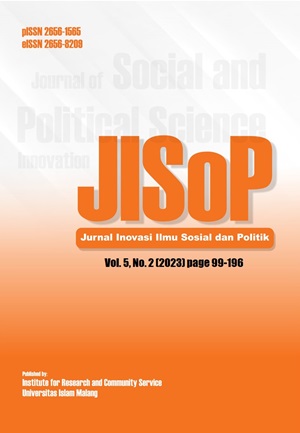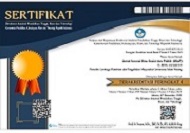Implementation of the power generation program by the Asian Infrastructure Investment Bank (AIIB) to improve the economy in Bangladesh
DOI:
https://doi.org/10.33474/jisop.v5i2.20896Keywords:
Bangladesh, AIIB, global governance, electrical energy, economyAbstract
This article examines the effectiveness of programs carried out by the Asian Infrastructure Investment Bank (AIIB) in encouraging economic investment and infrastructure connectivity in Asia. Specifically, the author will analyze AIIB assistance in Bangladesh in the electrical energy sector. AIIB is a multinational development bank initiated by China to encourage infrastructure in Asia. In terms of long-term funding for infrastructure sub-projects such as sub-projects in the areas of power production, ICT, cross-regional transportation, etc., AIIB has emerged as one of the most important development partners for Bangladesh. This paper aims to answer how effective the implementation of the electricity sector program by AIIB is in improving the economy in Bangladesh. To examine this topic, the author refers to Development theory and the concept of Global Governance. The results of the author's analysis show that most of the assistance provided by AIIB in Bangladesh focuses on the electrical energy sector, this is a response to the electricity crisis which is hampering the Bangladesh economy. The results of implementing the program are considered quite effective because it succeeded in distributing electricity evenly in villages and encouraging development renewable and low-carbon electrical energy infrastructure. However, this program can also be considered less effective because it has not been able to encourage Bangladesh to maximize its own natural resources to guarantee its electricity supply due to the low share of the renewable energy market in Bangladesh's electricity.
References
Alam, S. (2023). Building Renewable Energy in Bangladesh. The National Bureau of Asian Research. https://www.nbr.org/publication/building-renewable-energy-in-bangladesh/
Asian Infrastructure Investment Bank. (2016). AIIB’s Board of Directors Approves $509 M Financing for its First 4 Projects: Power, Transport and Urban: Investments span South, Southeast and Central Asia. AIIB. https://www.aiib.org/en/news-events/news/2016/AIIBs-Board-of-Directors-Approves-$509-M-Financing-for-its-First-4-Projects-Power-Transport-and-Urban-Investments-span-South-Southeast-and-Central-Asia.html
Asian Infrastructure Investment Bank. (2019). AIIB Approves USD100 Million Loan to Improve Bangladesh Water Supply, Sanitation. Retrieved from AIIB. AIIB. https://www.aiib.org/en/news-events/news/2019/AIIB-Approves-USD100-Million-Loan-to-Improve-Bangladesh-Water-Supply-Sanitation.html
Asian Infrastructure Investment Bank. (2020). Bangladesh: Dhaka and West Zone Transmission Grid Expansion Project. Asian Development Bank. https://www.adb.org/projects/51137-003/main
Asian Infrastructure Investment Bank. (2022). AIIB Signs USD200M On-lending Facility to Support Sustainable Infrastructure Development in Bangladesh. Retrieved from Asian Infrastructure Investment Bank (AIIB). https://www.aiib.org/en/news-events/news/2022/AIIB-Signs-USD200M-On-lending-Facility-to-Support-Sustainable-Infrastructure-Development-in-Bangladesh.html
Basri, M. C. (2019). The Role of AIIB in the ‘New Normal’ Era for Indonesia and ASEAN. Global Policy, 10(4), 614–618. https://doi.org/10.1111/1758-5899.12744
Bob, D. E. (2015). Asian Infrastructure Investment Bank: China as Responsible Stakeholder? Sasakawa Peace Foundation. AS.
Crossley, G. (2020). China-backed AIIB approves $100 mln loan to Bangladesh to fight COVID-19 (M. Anantharaman (ed.)). Reuters. https://www.reuters.com/article/health-coronavirus-aiib-bangladesh/china-backed-aiib-approves-100-mln-loan-to-bangladesh-to-fight-covid-19-idUSL4N2FU1XW/
Fanny, C. R., Arifianti, D. N., & Augusta, E. D. (2019). Asian Insfastructure Investment Bank (AIIB) Sebagai Bentuk Hegemoni Baru Tiongkok. Nation State: Journal of International Studies, 2(1), 71–87. https://doi.org/10.24076/NSJIS.2019v2i1.147
Fatile, J. O., Afegbua, I. S., & Ejalonibu, G. L. (2016). New Global Financial Order and Promotion of Asian Infrastructural Investment Bank (AIIB): Opportunities and Challenges for Africa. Africa’s Public Service Delivery and Performance Review, 4(1), 118–146. https://doi.org/10.4102/apsdpr.v4i1.108
Hadari, N. (2000). Metodologi Penelitian Bidang Sosial. Gajah Mada University Press.
Islam, M. S., Al-Amin, A. Q., & Sarkar, M. S. K. (2021). Energy crisis in Bangladesh: Challenges, progress, and prospects for alternative energy resources. Utilities Policy, 71. https://doi.org/10.1016/j.jup.2021.101221
Islam, S. M. S. (2023). AIIB Loans to Bangladesh: A New Arena of Economic Diplomacy? The Geopolitics. https://thegeopolitics.com/aiib-loans-to-bangladesh-a-new-arena-of-economic-diplomacy/
Kai, H., & Huiyun, F. (2018). Game of Institutional Balancing China, The AIIB, and The Future of Global Governance. S. Rajaratnam School of International Studies, 314, 1–20. http://www.jstor.org/stable/resrep19929
Kim, S., & Sanghoon, K. (2023). China’s contestation of the liberal international order. The Pacific Review, 36(6), 1215–1240. https://doi.org/10.1080/09512748.2022.2063367
Kyung-Hoon, K. (2017). China-led AIIB approves $60 million to finance Bangladesh gas project. Reuters. https://www.reuters.com/article/china-aiib-investment-idINKBN16Z09X/
Moeleong, lexy J. (2006). Metodologi Penelitian Kualitatif. PT Remaja Rosdakarya.
Mollaer, O. (2016). Development state: a theoretical and methodological critique. Bulletin of Economic Theory and Analysis, 1(1), 1–12. https://doi.org/10.25229/beta.265156
Power Technology. (2020). AIIB approves $200m loan to improve electricity access in Bangladesh. Power-Technology.Com. https://www.power-technology.com/news/aiib-approves-200m-loan-to-improve-electricity-access-in-bangladesh/?cf-view
Power Tecnology. (2018). AIIB approves loan for Bangladesh Bhola IPP energy project.
Siddique, A. (2022). Bangladeshi industries explore renewables as power crisis looms. Mongabay. https://news.mongabay.com/2022/09/bangladeshi-industries-explore-renewables-as-power-crisis-looms/
Silk Road Chamber of International Commerce. (2020). AIIB approves 200-mln USD for Bangladesh project to improve access to electricity. Srcic.Org. https://srcic.org/news/aiib-approve-200-mln-usd-for-bangladesh-project/
Sitanggang, S. P. (2017). Peran United Nations Development Programme (UNDP) dalam Penanggulangan Kemiskinan di Bangladesh Tahun 2007-2017. EJournal Ilmu Hubungan Internasional, 5(3), 817–832.
Sugino, M. (2004). Global Governance Sebagai Agenda Penelitian Dalam Studi Hubungan Internasional. Jurnal Ilmu Sosial Dan Politik, 8(2), 197–212. https://doi.org/10.22146/jsp.11053
Tachev, V. (2023). The Electricity Sector in Bangladesh: What Comes Next? Energy Tracker Asia. https://energytracker.asia/the-electricity-sector-in-bangladesh-what-comes-next/
Tamim, M. (2023). The economy failed the success of power generation capacity. The Busieness Strandrad. https://www.tbsnews.net/supplement/economy-failed-success-power-generation-capacity-576458
Wahyudi, A. (2003). Globalisasi kemiskinan dan ketimpangan global. Jurnal Ilmu Sosial Dan Ilmu Politik, 7(2), 161–174. https://doi.org/10.22146/jsp.11070
Weerakoon, D., & Jayasuriya, S. (2019). Debt Financing for Development: The Sri Lankan Experience. In Managing Domestic and International Challenges and Opportunities in Post-conflict Development. Springer.
Xinhua. (2019). Big changes in a small village. Retrieved from Xinhua Silk road. Silk Road Information Service.
Downloads
Published
How to Cite
Issue
Section
License
Copyright (c) 2024 Aulia Aisyah Zuha

This work is licensed under a Creative Commons Attribution-ShareAlike 4.0 International License.
.



_-_Copy.jpg)





